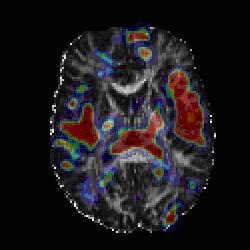Ben-Gurion University of the Negev in Israel says it has licensed a technology from its labs that crosses the blood-brain barrier to deliver drugs for treating disorders of the brain and central nervous system. The V-Smart technology, as its called, was licensed exclusively to Lauren Sciences LLC, a privately held biotechnology company in New York.
Lauren Sciences is expected to develop the technology as a platform for treating a variety of diseases that affect the central nervous system, such as Parkinson’s, Alzheimer’s, Amyotrophic Lateral Sclerosis (ALS, or Lou Gehrig’s Disease), and brain tumors.
The V-Smart technology uses tiny — 20 to 100 nanometers; 1 nanometer equals 1 billionth of a meter — lipid bubbles called vesicles that can cross the blood-brain barrier to deliver drugs to specific targets in the brain. The nano-vesicles act as building blocks for the delivery of drugs in the desired quantities.
The technology was developed by Ben-Gurion researchers Sabrina Grinberg, Charles Linder, and Eliahu Heldman, who also serves as the chief technology officer of Lauren Sciences. Heldman says their preclinical studies show the nano-scale vesicles, “encapsulate small molecules, peptides, proteins and nucleic acids, cross the [blood-brain barrier] and release their encapsulated contents in the brain.” The researchers say there is an unmet need for a safe, effective, and reliable transport system to deliver chemotherapeutic agents to the brain of patients with brain cancer and other central nervous system disorders.
Lauren Sciences was recently awarded a grant from the Michael J. Fox Foundation to develop a V-Smart treatment for Parkinson’s disease. The university says the V-Smart technology is protected by several worldwide patents filed by BGN Technologies Ltd., its technology transfer office.
Read more: Organic Nanoparticle in Development for Cancer Drug Delivery
* * *


 RSS - Posts
RSS - Posts
You must be logged in to post a comment.